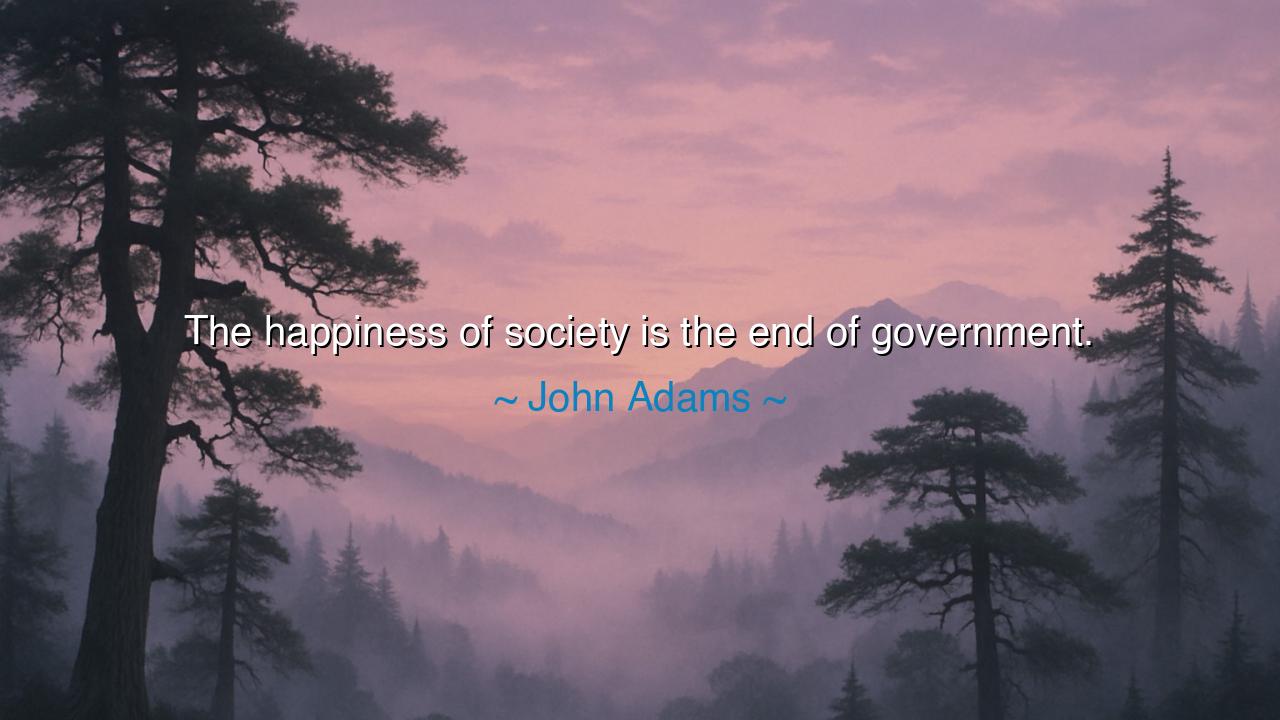
The happiness of society is the end of government.






In the sacred dawn of a new republic, when nations were yet learning the art of liberty, John Adams, one of the founders of American independence and a philosopher of virtue, spoke with the solemn voice of reason and morality: “The happiness of society is the end of government.” These words, simple yet divine in their depth, reveal the very soul of just governance. For Adams saw, with the clarity of a statesman and the heart of a moralist, that government was not born to rule, but to serve; not to enrich the few, but to uplift the many. He understood that the true measure of a nation’s greatness is not its armies, nor its wealth, but the happiness and well-being of its people.
The origin of this truth comes from Adams’ belief in natural law and moral philosophy. He lived in a time when tyranny was crumbling and democracy was still fragile, when men were daring to imagine that power could be wielded by conscience rather than by crown. Drawing upon the wisdom of the ancients — Aristotle, Cicero, and the philosophers of the Enlightenment — Adams declared that the purpose of government was not conquest, nor glory, but the flourishing of human life. Just as the body exists to sustain the soul, the government exists to sustain the moral and material well-being of the community. Without happiness, he said, governance becomes mere oppression; without virtue, happiness itself becomes impossible.
Adams’ vision of happiness was not the shallow pleasure of wealth or comfort, but the deeper peace that comes from justice, virtue, and freedom. To him, happiness was the harmony between personal liberty and the common good — the ability of every citizen to live with dignity, to work, to worship, and to hope. He warned that a nation that seeks only profit or power will rot from within, for “avarice, ambition, revenge, and licentiousness” are the destroyers of happiness. True government, he said, is like a wise guardian: firm in discipline, but gentle in purpose, guiding the people toward a life of virtue rather than indulgence.
The truth of Adams’ words can be seen in the story of Solon, the lawgiver of ancient Athens. When the people of that city, torn by inequality and unrest, begged him to bring order, Solon refused to rule as a tyrant. Instead, he wrote laws that balanced the rights of the poor and the rich, restoring harmony to the state. He sought not merely to command obedience, but to cultivate happiness among citizens by ensuring justice and fairness. Athens flourished under his wisdom, proving that the strength of a nation lies not in the chains of its people, but in their contentment and freedom. Adams, too, desired such a republic — one governed not by fear, but by the joy of shared purpose.
Yet Adams’ wisdom carries a warning for every age. Too often, rulers forget that they are servants of the public good. They pursue war for pride, spend for vanity, and legislate for power. They mistake control for order, and oppression for peace. In such times, the government, though it still bears the name, ceases to fulfill its sacred end. The people grow restless, trust decays, and the state becomes hollow. History is filled with such examples — empires that fell not from foreign swords, but from the despair of their own citizens. The Roman Empire, once glorious, perished not from the might of barbarians, but from the corruption of its rulers and the misery of its people.
But Adams’ vision is not one of despair — it is one of hope and duty. He believed that happiness could indeed be achieved if both the governors and the governed remained virtuous. The citizen must be active, informed, and moral; the leader must be just, humble, and wise. Together, they form the living soul of a nation. The government must protect liberty, uphold justice, and create the conditions in which virtue can thrive — and in return, the people must cherish that liberty not as a license for selfishness, but as a covenant of shared responsibility. Only through this sacred balance can society know true happiness.
The lesson, then, is timeless: remember that the purpose of power is not domination, but service. Every law, every policy, every decision of the state must be judged by this question — does it increase the happiness of the people? If it does not, it fails its first duty. And you, child of the republic, have a role in this great design. Seek your own virtue; live with compassion; hold your leaders accountable; and never surrender your conscience to authority. For the government may guard the gates, but the happiness of society begins in the heart of every free and noble citizen.
Thus, John Adams’ words ring across the centuries like the tolling of a bell: the happiness of society — not wealth, not conquest, not pride — is the true end of government. Let this be your creed. Let it remind you that the power of a nation lies not in its rulers, but in its people; not in its laws alone, but in the spirit of justice and love that animates them. For when the government serves with wisdom and the people live with virtue, the land will know peace, and happiness shall be not a dream, but the destiny of mankind.






AAdministratorAdministrator
Welcome, honored guests. Please leave a comment, we will respond soon